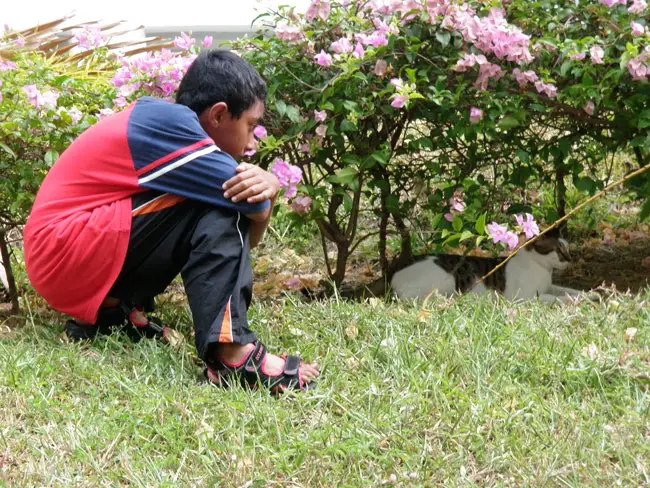
.A report released Thursday gives Florida a failing grade for the legal rights it affords abused and neglected children.
The state-by-state study – A Child’s Right to Counsel: A National Report Card on Legal Representation for Abused and Neglected Children – was conducted by two national child advocacy organizations, First Star and the Children’s Advocacy Institute at the University of San Diego School of Law.
The report graded each state and the District of Columbia on how well they protect the legal rights of abused and neglected children in dependency court. Florida was among the ten states that failed.
Florida earned the study’s low ranking because its law makes the appointment of an attorney for children in dependency cases discretionary, not mandatory. When an attorney is appointed, the duration of the appointment isn’t specified. Florida was also cited for not addressing caseloads for attorneys in such cases.
But Alan Abramowitz, executive director of the statewide Guardian ad Litem program, said the report compares apples and oranges when it comes to Florida. Under the federal Child Abuse Prevention and Treatment Act, he said, the state has the option of choosing a different model than the one on which the study is based – an attorney for each child.
“Florida has chosen the model that has Guardians ad Litem or court-appointed special advocates,” he said. “[The report] isn’t measuring whether you get good outcomes for children – they’re just measuring whether you have an attorney that represents the child’s expressed wishes.”
When the child’s wishes are different than what the Guardian ad Litem recommends, Abramowitz said, the program is required by law to tell the judge what the child’s wishes are.
According to the Florida Department of Children and Families, 31,692 children received out-of-home care – meaning they were removed from their homes due to safety concerns – in Fiscal Year 2010-2011.
Of those, said Abramowitz, 68 percent have a Guardian ad Litem. The program has 500 paid staff and 8,000 volunteers.
“We represent the child’s best interests,” he said. “And these volunteers do a lot more than what happens in court.”
He also noted that the Guardian ad Litem program just won the Eagle Award from the Prudential-Davis Productivity Awards and Florida TaxWatch, awarded for being a state program that “costs the least and benefits the most.”
But a long-time attorney and child advocate, Andrea Moore, said that while the Guardians serve a real purpose, they don’t work for the child.
“Their job is to develop an opinion of what’s in the child’s best interests,” she said. “The attorneys for the Guardian ad Litem program do not have an attorney-client relationship with the child. They work for the program.”
According to the U.S. Department of Health and Human Services, more than 695,000 children each year are victims of abuse and neglect at the hands of their parents or legal guardians. An estimated 1,560 children die each year as a result.
“Regrettably, many states still cling to a troubling double standard that affords the right to counsel to accused abusers while withholding it from abused and neglected children,” said Robert Fellmeth, director of the Children’s Advocacy Institute, in a statement.
He and other authors of the report say that because dependency courts take a parental role in deciding the future of abused and neglected children, an attorney is needed to fully participate in the legal proceedings and help the children understand what’s at stake.
“It has always troubled me that every party to the case except the child has an attorney,” said Moore. “On the other hand, not every child needs an attorney.
“But those who do generally really need an attorney – and don’t have one.”
The report cites data indicating that children who have adequate legal representation “achieve permanent placements more quickly – sparing them additional distress and uncertainty, while saving tax dollars associated with repeated out-of-home placements.”
To view the full report, visit www.firststar.org, or www.caichildlaw.org. Previous editions were issued in 2007 and 2009, and the advocacy groups say that since the first report, many states have adopted stronger legal protections.
–Margie Menzel, News Service of Florida





























Outsider says
Why don’t they give the failing parents an “F?” Why don’t they give a welfare system that encourages incompetent adults to give birth for financial gain, with no accountability other than removing a child from a parent that doesn’t want them in the first place?” I wonder who wrote a report that cites the state for not prividing every child a lawyer….lawyers, maybe?
John Boy says
Simply another unintended consequence of the Reich Winged Religious Bigots and the Catholic Church. I say tax the Republicans and Churches who created this problem.
B. Claire says
“A report released Thursday gives Florida a failing grade for the legal rights it affords abused and neglected children.”
Oh, now there’s a shocker…just reading some sites ‘comments’ where the vast majority of parents are PROUDLY stuck in the ignorant 50’s of cruel child discipline/abuse…proves Florida more than earns its failing grade…with the price being no break in the cycle of abuse from one generation to the next. How can such a beautiful state harbor such ugly treatment of children…and with such impunity?
PC Dad says
Guardians ad Litem (GAL) do a much better job then the community based care case managers. GALs at least find out what the kids want in life, talk to them instead of about them and spend time with these kids. Case managers just go out and make sure the kids are alive each month, deal with pushing paperwork all the time and try to get out of the house where the kids are as fast as possible. Thank God for the GALs because these kids would be a lot worse off with just the case managers looking out for them.